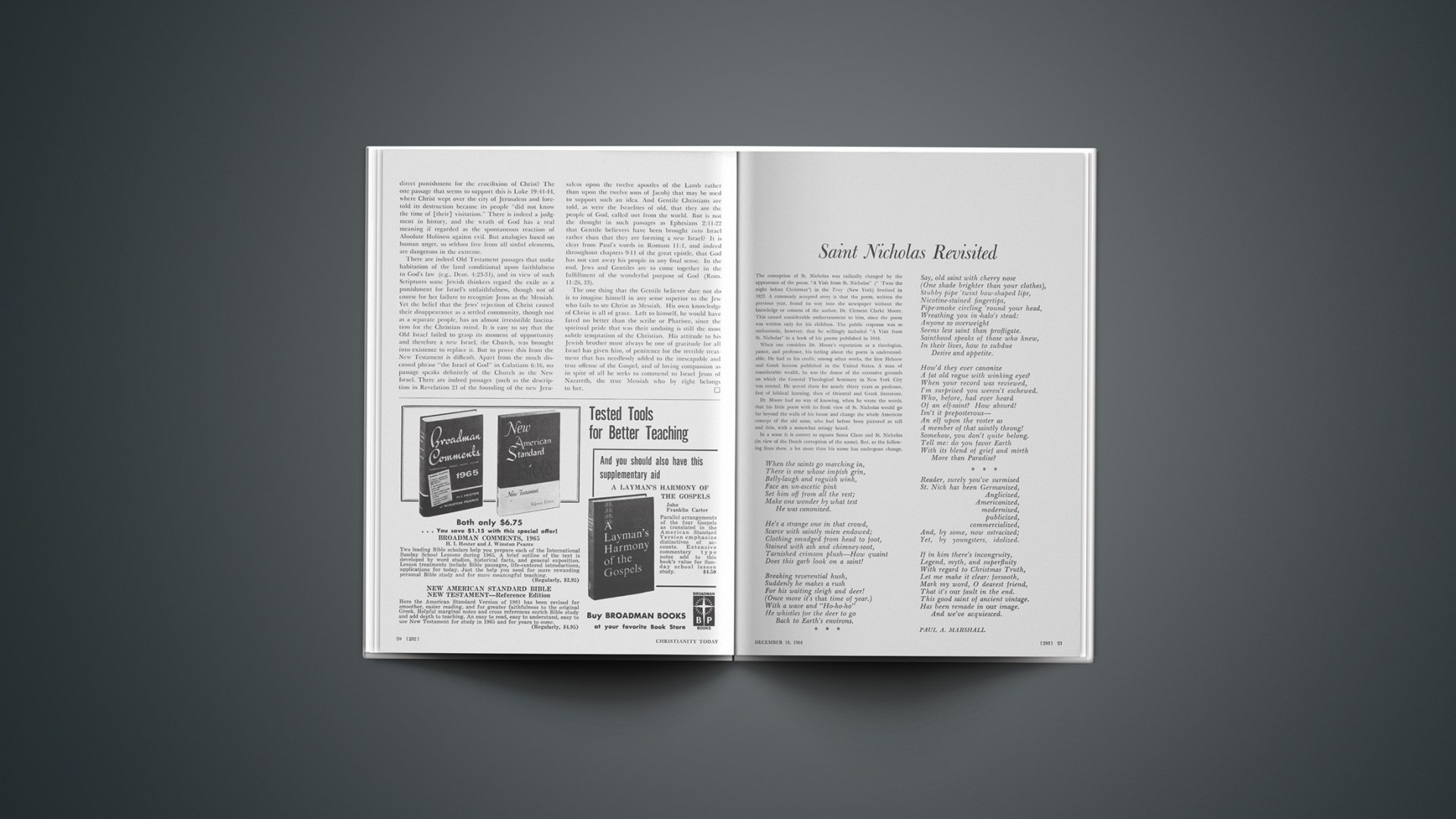The conception of St. Nicholas was radically changed by the appearance of the poem, “A Visit from St. Nicholas” (“ ’Twas the night before Christmas”) in the Troy (New York) Sentinel in 1823. A commonly accepted story is that the poem, written the previous year, found its way into the newspaper without the knowledge or consent of the author, Dr. Clement Clarke Moore. This caused considerable embarrassment to him, since the poem was written only for his children. The public response was so enthusiastic, however, that he willingly included “A Visit from St. Nicholas” in a book of his poems published in 1844.
When one considers Dr. Moore’s reputation as a theologian, pastor, and professor, his feeling about the poem is understandable. He had to his credit, among other works, the first Hebrew and Greek lexicon published in the United States. A man of considerable wealth, he was the donor of the extensive grounds on which the General Theological Seminary in New York City was erected. He served there for nearly thirty years as professor, first of biblical learning, then of Oriental and Greek literature.
Dr. Moore had no way of knowing, when he wrote the words, that his little poem with its fresh view of St. Nicholas would go far beyond the walls of his house and change the whole American concept of the old saint, who had before been pictured as tall and thin, with a somewhat stringy beard.
In a sense it is correct to equate Santa Claus and St. Nicholas (in view of the Dutch corruption of the name). But, as the following lines show, a lot more than his name has undergone change.
When the saints go marching in, There is one whose impish grin, Belly-laugh and roguish wink, Face an un-ascetic pink
Set him off from all the rest; Make one wonder by what test He was canonized.
He’s a strange one in that crowd, Scarce with saintly mien endowed; Clothing smudged from head to foot, Stained with ash and chimney-soot, Tarnished crimson plush—How quaint Does this garb look on a saint!
Breaking reverential hush, Suddenly he makes a rush For his waiting sleigh and deer! (Once more it’s that time of year.)
With a wave and “Ho-ho-ho” He whistles for the deer to go Back to Earth’s environs.
Say, old saint with cherry nose (One shade brighter than your clothes), Stubby pipe twixt bow-shaped lips, Nicotine-stained fingertips, Wreathing you in halo’s stead: Anyone so overweight Seems less saint than profligate.
Sainthood speaks of those who knew, In their lives, how to subdue Desire and appetite.
How’d they ever canonize A fat old rogue with winking eyes? When your record was reviewed, I’m surprised you weren’t eschewed.
Who, before, had ever heard Of an elf-saint? How absurd! Isn’t it preposterous— An elf upon the roster as A member of that saintly throng! Somehow, you don’t quite belong.
Tell me: do you favor Earth With its blend of grief and mirth More than Paradise? Reader, surely you’ve surmised St. Nick has been Germanized, Anglicized, Americanized, modernized, publicized, commercialized, And, by some, now ostracized; Yet, by youngsters, idolized.
If in him there’s incongruity, Legend, myth, and superfluity With regard to Christmas Truth, Let me make it clear: forsooth, Mark my word, O dearest friend, That it’s our fault in the end.
This good saint of ancient vintage. Has been remade in our image. And we’ve acquiesced.









